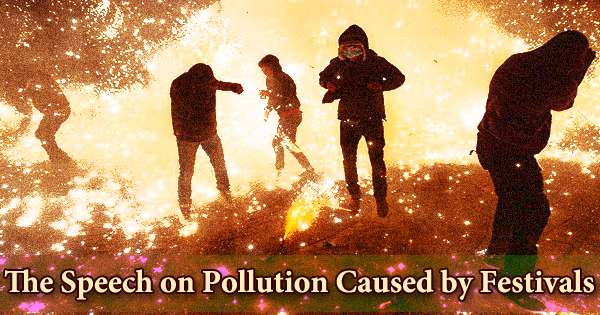A very Good Morning/Afternoon/Evening (Ladies and Gentlemen) to Honorable Principal Sir/Madam, respected teachers, parents, seniors, and my dear friends/students, Warm Greetings to Everyone!
Thank you all for taking out time and being present at this seminar session. Today, I ……(name) stand in front of you all to address a very important topic which is making a lot of news these days; I would like to speech on the topic of “Pollution Caused by Festivals.”
Festivals are lovely; they bring people together and provide pleasure, joy, and serenity into our lives. In our nation, we have a lot of festivals. These festivities, however, have certain drawbacks. They have a negative impact on our environment and Mother Earth. During festivities, we pollute the air, water, and noise, and they have a significant influence on our health. Not to mention the animals and birds who are affected. Cracker exploding not only pollutes the air but also makes a lot of noise.
Humans love to celebrate. We’ve marked our planet with ancient rites, seasonal festivities, and beloved festivals for millennia. These time-honored customs have been passed down through the centuries, changing to fit the current environment. There are so many different varieties of crackers nowadays that they merely add to the pollution in the air. These crackers are popular among children, but they are unaware that they pollute the air we breathe. This must be prevented; we must teach our children and raise awareness about the environmental hazards of crackers.
Water is a necessary component of our daily life. Because it is impossible to exist without water, all human settlements have been located near water sources since the dawn of civilization. However, water contamination is currently one of the most serious environmental challenges we face. Humans have contaminated every major body of water, and marine life has suffered as a result. Even if firecrackers are only used once in a while, they produce a lot of noise pollution, as well as air pollution, making it difficult for humans to breathe. Despite our government’s prohibition on the use of firecrackers, we continue to act immaturely and seek for ways and circumstances to let off fireworks.
However, with a specific emphasis on our children, I would like to suggest that they observe this festival of lights without the use of fireworks in order to help safeguard our environment from dangerous, poisonous fumes. Saving our environment or planet entails keeping life on the globe, which necessarily entails saving ourselves so that we may breathe in a clean, pollution-free atmosphere. Though this is insufficient, there are additional causes that affect our environment, such as poisonous gases generated by automobiles, fumes spewed from manufacturing chimneys, and so on.
During some festivities, adorned sculptures are paraded through the streets and submerged in water. This technique adds a significant quantity of pollutants to our water sources. The water gets polluted and unsuitable for use when these sculptures are submerged. Because of the chemicals included in this water, it might contaminate crops if utilized for irrigation. Sky lanterns are commonly released during cultural events, weddings, and to commemorate loved ones. The sight of floating lanterns lighting the night sky is both beautiful and dangerous. Sky lanterns are a popular ritual in Southeast Asia, however, due to their destructive nature, governments are attempting to enforce limits.
Animals and wildlife are also endangered by the lanterns. Once they hit the ground, they can injure wildlife by strangling birds caught in the wires and killing animals who unwittingly eat the lanterns. Even so-called “biodegradable” lanterns are hazardous since the ingredients take a long time to degrade. Balloon releases are similarly harmful to animals, taking years to disintegrate. It’s the same as if you threw trash on the ground. A confetti or glitter explosion is a wonderful way to commemorate a festival, graduation, or wedding. When all of that plastic falls to the ground, though, it presents a threat for animals that may ingest it and die as a result.
Even if you throw confetti inside, you’ll have to sweep it into the trash, which will end up in a landfill. Plastic confetti and glitter don’t degrade and can’t be recycled, therefore they’re bad for the environment. A developing country, like as ours, is still grappling with the issue of environmental pollution, and there appears to be no way out. It is so unsurprising that pollution levels spike to 30% during the …… festival. It has been calculated that the compound strontium in the air increases by 120 times for every hour of firework display (it is safe in tiny amounts, but in bigger numbers, it does a lot of damage to our bones and can even lead to blood clotting issues).
People all around the globe enjoy the practice of decorating their trees and placing wrapped gifts beneath the branches to be unwrapped on Christmas Day every December. With an avalanche of trussed-up trees springing up in homes and towns throughout the world, it’s critical to understand the environmental effect of this popular tradition. A false tree may be reused year after year, but these plastic replicas will eventually wind up in landfills and will never decompose. Furthermore, fake trees are frequently constructed from petroleum-based polymers, releasing hazardous chemicals into the atmosphere throughout the manufacturing process. Real trees, on the other hand, absorb dangerous greenhouse gases while growing and are completely biodegradable. Unfortunately, most tree farmers employ pesticides and artificial fertilizers, and many farms clear vast areas of land to plant fir tree plantations just for the Christmas season.
Festivals bring people together and give them a sense of sovereignty, but they also generate a lot of pollution and harm to the environment. It is also our responsibility as citizens of the country to safeguard our natural resources, as they are our riches. We must discover methods to celebrate festivals while also conserving the environment. It is past time for us to reflect on our acts and try to make amends, or else I worry that life on Earth will come to an end, and if the human race survives at all, it will be reduced to a repository of physical problems and diseases.
Also, many thanks to you and everyone else who is here.
This is all I have to say today.
Thank you all.
















